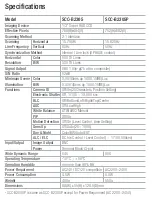
PDA-100 Photodiode Array Detector
1-2
Doc. 031644-02 9/03
To take full advantage of the capabilities of the PDA-100, order the 3D option for
the software. The 3D option is required in order to perform the following:
•
3D data presentation and spectral analysis (real-time or post-run)
•
Peak purity analysis with selectable criteria
•
Spectral library search for positive peak identification
•
Optimal integration path determination for method optimization
1.2
Theory of Photodiode Array Detection
Monochromatic variable wavelength detectors monitor eluting components of the
sample at a single wavelength (ideally, the wavelength of maximum absorbance),
whereas photodiode array (PDA) detectors scan a range of wavelengths every few
milliseconds and continually generate spectral information. Wavelength, time, and
absorbance can all be plotted.
PDA detectors provide three-dimensional information that allows an accurate
assessment of peak identity, purity, and quantitation in a single run. Software
support for PDA detectors includes peak purity and spectral library search
functions to help determine peak homogeneity and identity.
1.2.1
Advantages of Photodiode Array Detection
PDA detectors are useful in both research and quality assurance
laboratories. In the research laboratory, the PDA provides the analyst with
a variety of approaches to the analysis. In the quality assurance
laboratory, the PDA provides several results from a single run, thereby
increasing the throughput of the HPLC.
PDA detection offers the following advantages:
•
Peak measurement at all wavelengths
In methods development, detailed information about the detector
conditions required for the analysis may not be known. When a
variable wavelength detector is used, a sample must often be injected
several times, with varying wavelengths, to ensure that all peaks are
detected. When a PDA detector is used, a wavelength range can be
programmed and all compounds that absorb within this range can be
detected in a single run.









































